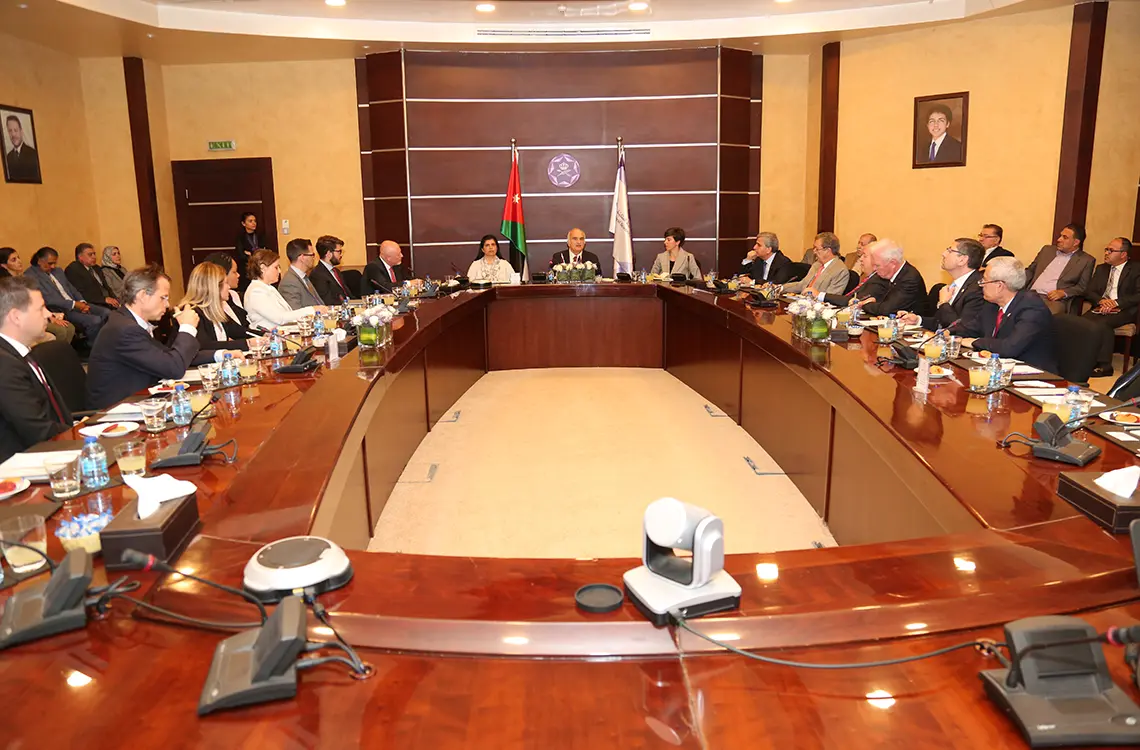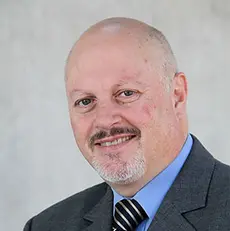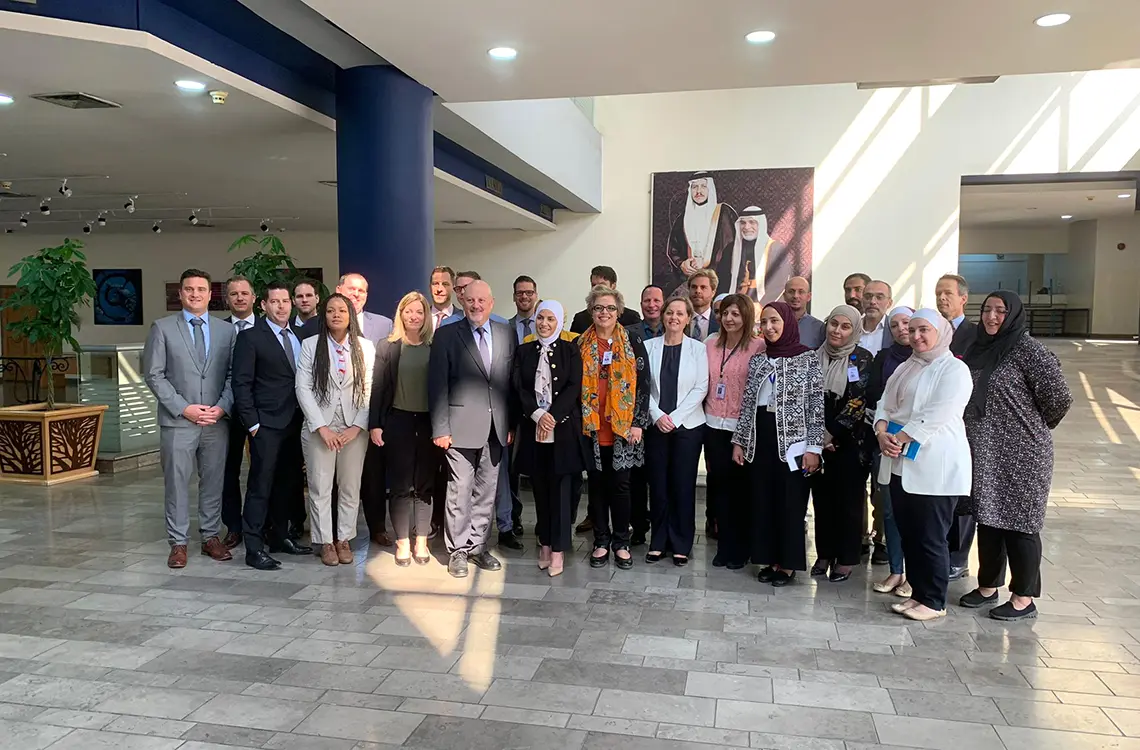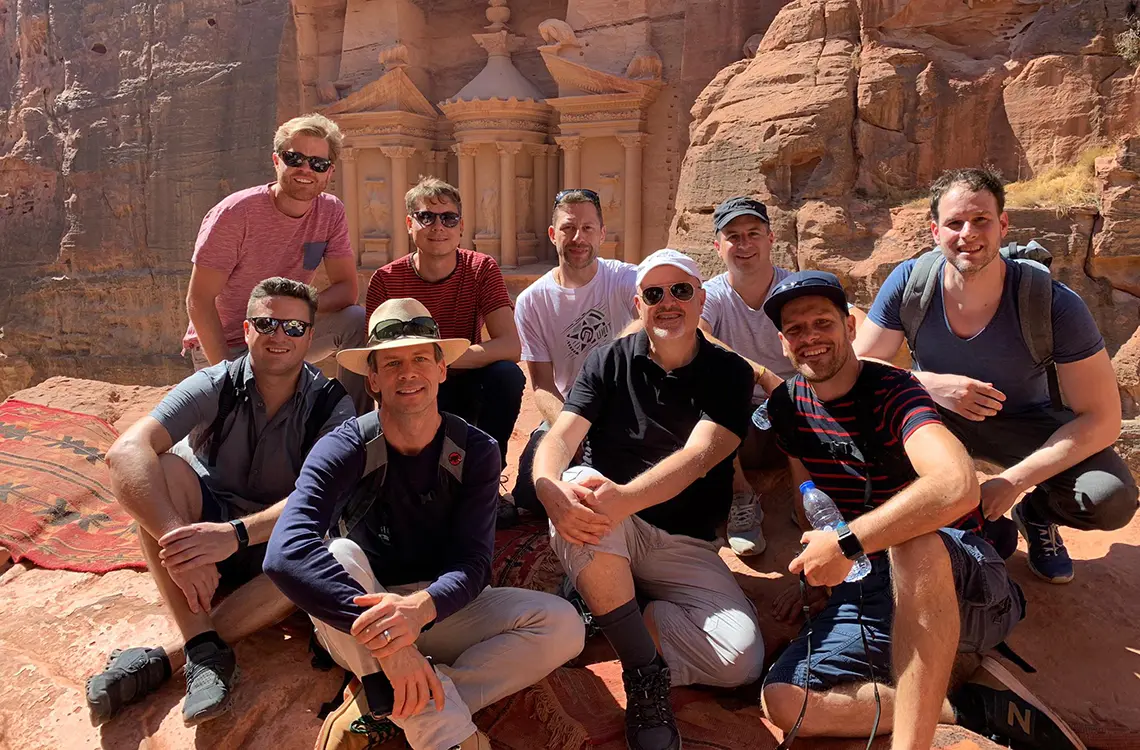Zoom In: Khaldoun Dia-Eddine
Khaldoun Dia-Eddine is a senior lecturer at the ZHAW School of Management and Law, where he has been teaching for 10 years. In addition, he is involved in various consultancy projects as well as research and scientific writing. We asked him a few questions about his recent study trip to Jordan.
Study Trip of our IEMBA Students to Jordan

November 2019
You recently took a group of IEMBA students to Jordan. What was the aim of that study trip?
Our first objective was to fulfil the requirement for the International Executive MBA program. Jordan was the second study trip of this year’s course.
Our second objective was to understand the business environment in the Middle East and beyond that to understand how business is conducted, not only concerning the context and the economic and political situation, but also the culture. Equally important was understanding how people react, interact, and behave while conducting business.
What was the highlight of the study trip?
For me, one of the big highlights was meeting His Highness Prince Hassan of Jordan, who gave a speech about the situation in general and about bridging the gap between Europe and the Middle East. He asked our students to be active and to come up with new ideas, initiatives, and activities to build such bridges and construct a world where peace and understanding is the rule.
What are the current trends in the Middle East region?
In talking about the Middle East, I think we have to look at two big trends that are going on in this region. The first concerns the political environment and the second the economic environment. Naturally, both are linked.
Concerning the political environment, there has been instability in the region for many years, and this is still ongoing. We have different crises, which are either interstate or intrastate. This also influences how people behave at the social, political, or economic level. As a direct implication for businesses entering the region, many things must be planned at relatively short notice; a long-term approach is difficult.
At the economic level, the impact of political instability is obvious, but we must also consider the impact of some social trends like the demographic development. In addition, new trends influencing economic growth must also be taken into account, like changes in the business models as a result of the digital transformation coming from new innovations, "Industry, 4.0”, smart cities, as well as ecological issues. These new models of business are new and evolving, and they are different than models in other parts of the world. In other words, there are specific aspects which are unique to the region as a result of its political instability and changing environment. It is not easy to understand how to conduct business in the Middle East, and I think that it is one of the advantages we have here at ZHAW, that we more or less understand big parts of this complex environment. This is an opportunity for us to coach, guide, or help companies willing to go there.
Of course, we are dealing with companies willing to invest in these countries. Here we touch on the issue of the attractiveness of these countries. There are factors which attract companies to go to these countries, like cheap manpower, short geographic distance, availability of raw materials, but there are also repelling factors that prevent investment. These include – depending on the country, a country’s market size, availability of some raw materials, purchasing power, geopolitical position, corruption and bad infrastructures without forgetting the prevailing political system, and sometimes the inadequate level of education.
The bilateral relations between Switzerland and the countries in the Middle -East are also of importance for an investment. There are some good agreements with some countries . Some countries are open to direct investments; they have the necessary frameworks. Others have a lot of bureaucracy and other complicated issues which make it difficult for investors to invest in these countries efficiently.
A few personal questions to Khaldoun Dia-Eddine

What do you like about your work at the ZHAW School of Management and Law?
First of all, the transfer of knowledge to young people is very important to me. Second, there are intellectual challenges, which we have to overcome. We always have to be open to the newest developments, whether they are economic, political, or technological. The exchanges with colleagues are also a source of satisfaction.
For me, it is also very interesting to deal with a region I know very well and which I naturally follow closely. In this way, I combine my personal interests with my responsibilities – which is fantastic for the development of new skills and capacities.
Do you have a favorite place in Winterthur?
What I like in Winterthur are some of the gardens of the city. Sometimes, during lunchtime, I take a walk there, which is wonderful if the weather is good.
What three things are you most thankful for?
I am thankful that we live in a country where peace and justice are the rule and prevail. I am also thankful that I have a good family, which supports what I do. In addition, I have a good working environment with great colleagues, who support me and give me the opportunity to improve my capacities and develop new ideas and projects. These are very important elements, which I enjoy.
If you had one wish which could be realized, what would it be?
Well, to have more justice in world affairs, whether economically or in politics. We are going to extremes – we see much extremism going on, regardless if this is in form of Islamism, populism, or dictatorial regimes, which may be secular or not but which are nonetheless extreme. This is not healthy.
In the economy, we see injustice. There is always a gap between rich and poor, and the middle class is disappearing in many regions around the world. We also see injustice in terms of access to different things. We see extremes through lack of consideration for the environment and the environmental impact of our actions. We strive for continuous growth without caring what this does to others. We always argue in economic terms and always seek more consumption without considering many other factors. These are issues which I would like to give more thought to.
If you could participate in the Olympic Games, in which discipline would you compete?
Well, something in a domain where concentration is needed – shooting maybe? Or something that is intellectual, for example chess – ok, chess is not an Olympic sport – rather than the physical disciplines, although I love to walk and swim – but far from Olympic levels!
If you had to describe your desk to someone, what would you say?
For somebody who does not know what I do, my desk might look chaotic because I always have many things to do in parallel. My papers are arranged in a certain way which is comfortable to me. I have a pile of materials related to teaching, one about general knowledge, and some which are for my ongoing research. Normally, I use many plastic folders, and every topic has its own, so I can just pick up the folder on my desk, and I have all the information I need.
Thank you very much for this interview, Khaldoun!
New Insights into International Business
International Management Institute
Further Zoom In articles

